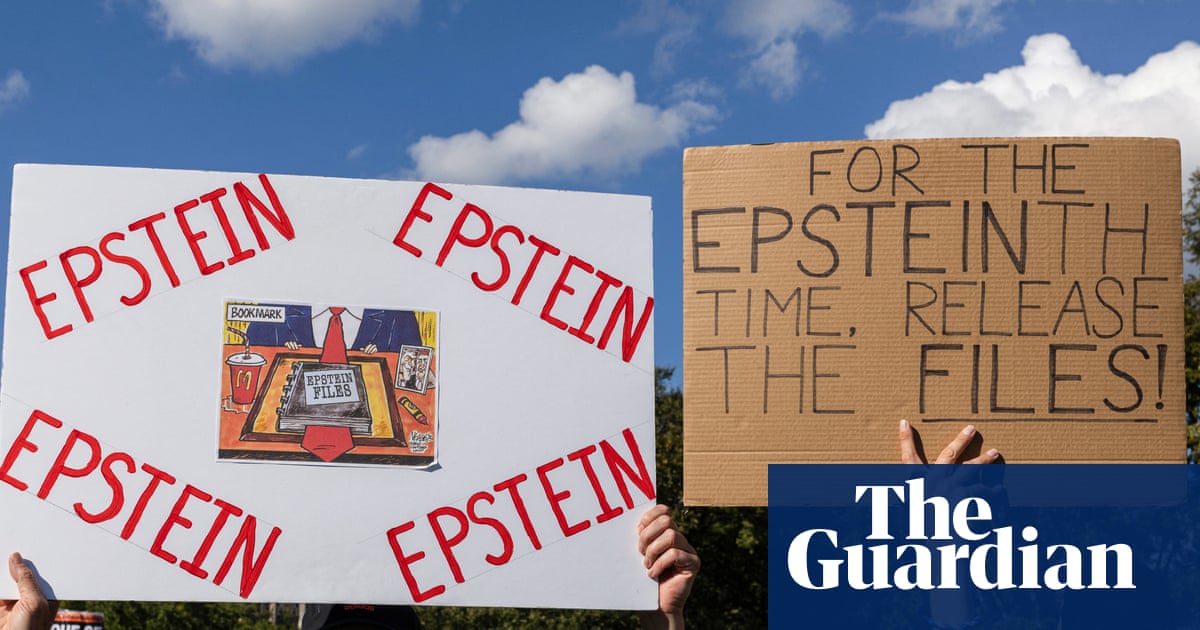In an Arizona town where farmers have long wrested a living off the arid land, reports that a former prison complex may be turned into an immigration detention center have sparked a fierce backlash, with residents seeing the potential transition as the latest undesirable symbol of the Trump administration’s massive escalation of immigration enforcement.
The facility in Marana, a town of about 63,700 people located north of Tucson, sprawls across a flat expanse of desert studded with scrubby bushes and hardy trees. It was shuttered almost two years ago, and the Management and Training Corporation, the private company that owns it, informed the town manager of company plans to operate a detention center in the prison.
During a town hall meeting on 23 October, residents crowded into a school auditorium to learn more from representatives of local government and advocacy organizations about the plan. Many attenders spoke against the jailing of immigrants amid Donald Trump’s crusade to deport as many undocumented immigrants as possible.
Karla Jones, one of the attenders, said she abhorred the idea of having a nearby detention center to hold immigrants – whose only crime in many cases is lacking US legal status, a civil offense – for extended periods of time. “That’s breaking up families,” she said. “And it’s people who are paying taxes, it’s people who are working. So I don’t want my community to support that.”
Federal legislation passed in July provided $45bn for US Immigration and Customs Enforcement (ICE) to build more detention centers for adults and children as part of a larger $75bn, four-year package for the federal agency. To vastly increase detention capacity, the federal government is relying heavily on for-profit private companies that run prisons.
The Utah-based Management and Training Corporation (MTC) is one of those companies. MTC built the Marana prison in the mid-1990s, when the population in the then largely farming community was about 2,000. It was the first private prison in the state.
In 2013, Arizona bought the prison for $150,000. In December 2023, the state – citing high costs and a decreasing incarcerated population – closed it. This past summer, after Arizona lawmakers rejected a bill that would have leased the prison for $1 a year to the federal government for use as an immigration detention center – MTC paid the state $15m to get it back.

Marana’s town manager, Terry Rozema, said there was little the town could do to prevent the use of the building complex as a detention center. “The facility is privately owned by MTC and is already properly zoned for use as a prison or an ICE facility. As such, the town doesn’t have authority to restrict its future use as long as it meets current zoning,” Rozema said in an emailed statement.
Emily Lawhead, MTC’s director of communications, declined an interview but wrote in an email that the company was “in discussions with several public agencies that may have a need for additional bed space”. ICE did not respond to questions regarding plans to use the onetime prison, but an agency spokesperson cited the need for “greater detention capacity” due to “a significant number of arrests”.
MTC already operates five immigration detention centers in California, New Mexico and Texas.
Its record in Arizona is spotty. In 2015, the state canceled a contract with the company after a riot at a prison it operated in the town of Kingman left more than a dozen incarcerated people and guards injured. A subsequent investigation by the Arizona department of corrections concluded that the company had “a culture of disorganization, disengagement and disregard” for state policies. MTC did not respond to the Guardian’s questions about those allegations, but the company has previously described the investigation’s findings as flawed.
Jennifer Allen, a member of the board of supervisors for Pima county, where Marana is located, said that given reports about the poor conditions facing ICE detainees across the country, she and her constituents were concerned about the treatment of people in the Marana facility if it were to be converted and about oversight of the facility. She criticized the federal government for showering immigration enforcement with resources while simultaneously cutting funding for social safety net programs for older adults, children and other vulnerable populations.
At the town hall, the federal government received plenty of criticism for its aggressive immigration agenda. Many attenders spoke against not just having a detention center in the vicinity, but also about the impact of social harms of the crackdown. Some residents brought signs bearing the slogan “Stop the kidnappings, protect your neighbors”, alluding to forceful arrests of immigrants in their homes, at work and in the streets.
Speaking to the crowd, Tucson resident Maximiliano Torres likened the Trump administration’s detention and deportation campaign to Arizona’s 2010 Senate Bill 1070, commonly known as the “show me your papers” law that empowered police to conduct immigration enforcement. Although police can still inquire about immigration status, it’s no longer required because courts have largely struck down the law as unconstitutional.
Recalling the law’s impact, Torres told the crowd: “They turned [crossing the border without authorization] into a criminal act, so they could justify putting those people in prison and forcing the federal government to pay private prisons.”
While Trump has repeatedly promised immigration enforcement efforts would be focused on undocumented immigrants who have committed crimes, statistics show that those being held in detention are primarily people without criminal convictions. As of September, 71.5% of the 59,762 immigrants in detention had no criminal conviction, according to the Transactional Records Access Clearinghouse at Syracuse University. Many convictions involved traffic violations and other minor offenses.
Under the Biden administration, immigrants with strong community ties and no serious brushes with the law would generally be released and be asked to check in with ICE periodically, since the government prioritized deporting people with criminal convictions, said Jennifer Ibañez Whitlock, senior policy counsel at the National Immigration Law Center. “Now everybody gets arrested, everybody gets detained,” she said.
The Trump administration has significantly expanded mandatory detention to keep immigrants in confinement during proceedings to remove them from the country, she said. “More and more often, people are just giving up and agreeing to be deported instead of sitting in jail trying to fight their case,” the attorney said.
In Marana, resident Tom Flynn left the town hall clutching one of the protest signs. He detests the possibility of an immigrant detention center in his town. “No 1, it’s morally objectionable,” he said. “No 2, it’s a detriment to the overall economy; it reduces the number of people who have been in the area, it depresses home values. And it’s so obviously politically driven.”
Marlis Dinning said what she heard at the town hall about the possible detention center was disturbing. “It seems like all of this has happened behind closed doors,” she said. She’s against the detention of immigrants, many of them asylum seekers who entered the country legally, and who now “have no way to get citizenship”, she said.
After the town hall, Jones was feeling quite unsettled by the overall discussion. But she vowed to participate in the mounting community pressure to keep the detention center at bay. “I really hope we can stop it from opening,” she said.

 German (DE)
German (DE)  English (US)
English (US)  Spanish (ES)
Spanish (ES)  French (FR)
French (FR)  Hindi (IN)
Hindi (IN)  Italian (IT)
Italian (IT)  Russian (RU)
Russian (RU)  3 weeks ago
3 weeks ago
























Comments